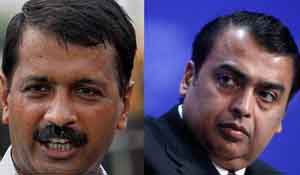
The EC has taken note of AAP leader Arvind Kejriwal’s argument that the notification amounts to the Union government violating the model code of conduct, which came into effect on March 5 with the announcement of election schedule.
EC Principal Secretary K Ajaya Kumar on Monday wrote to Saurabh Chandra, secretary of the Ministry of Petroleum and Natural Gas, conveying him the Commission’s decision to defer notifying the new gas price for the quarter from April to June this year.
He also informed the Ministry of Petroleum and Natural Gas that the EC had taken the decision to defer the gas price hike after considering all “relevant facts”, including the fact that the matter was sub judice before the Supreme Court.
Kejriwal argued that the oil ministry will violate the model code of conduct if it raises gas price. He has alleged that the move to raise the price was aimed at providing windfall gains to Reliance Industries of Mukesh Ambani.
Petroleum Minister M Veerappa Moily had earlier stated that the proposal to raise gas prices for both public sector and private producers was twice considered and approved by the Union Cabinet. The ministry notified in January this year the “Domestic Natural Gas Pricing Guidelines, 2014” that will apply to all natural gas produced domestically, irrespective of the source, whether conventional, shale or coal-bed methane from April 1, 2014.
According to the new gas-pricing formula, the rates will be doubled from the current cost. For all domestically produced gas, the rates will be in the range of $8.2 - $8.4 per unit.
According to the notification, gas from April 1 would be priced at an average price of liquid gas (liquefied natural gas or LNG) imports into India and benchmark global gas rates. This formula will be applicable for five years till March 31, 2019.
The new rates will change every quarter based on the 12-month average of global rates and LNG import price with a lag of one quarter. This would apply to all gas produced by public and private sector firms.
The monthly revision of petrol and diesel prices, however, would not require EC nod as the government had taken the policy decision much earlier.





Comments
Add new comment